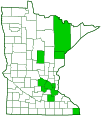honeysuckle moth
(Ypsolopha dentella)
Conservation • Description • Habitat • Ecology • Distribution • Taxonomy
|
|
||||||||||||||||||
Description |
Honeysuckle moth, also called European honeysuckle moth, is a small, exotic, falcate-winged moth. It is native to Europe and Asia. It was accidentally introduced from Europe into North America, where it now occurs in the United States from Maine to Connecticut, west to Minnesota, and across southern Canada. It is found in a wide variety of habitats, including forests, shrubby prairies, gardens, and anywhere else its host is found. Larvae feed on honeysuckle. Adults are ⅜″ to 7⁄16″ (10 to 11 mm) in length and have a ¾″ to ⅞″ (20 to 22 mm) wingspan. The head and thorax are white. The antennae are banded, each antennal segment half brown and half white. The finger-like mouthparts (palps) project forward, snout-like. They are white above and brown on the sides. The forewings are dark chocolate brown with a white stripe on the inner margin that curves inward to the postmedial area. When viewed from the side, the tip of the forewing is sharply curved upward, appearing hooked. This is the feature that gives the species the first part of its common name “falcate”, which means curved. The hindwings are uniformly dark gray. The legs are brown with a highly variable amount of white speckling. They may appear mostly to entirely one color or the other. Early stage (instar) caterpillars are entirely green. Late instar caterpillars are purple or pinkish-red above. They feed in a loose web. |
Size |
Total length: ⅜″ to 7⁄16″ (10 to 11 mm) Wingspan: ¾″ to ⅞″ (20 to 22 mm) |
Similar Species |
Habitat |
|
Ecology |
Season |
July and August |
Behavior |
Honeysuckle moth rests with its head down, the antennae held forward, and the rear of its body and the wings elevated – the headstand position. Adults are active at night and will come to lights. |
Life Cycle |
|
Larva Hosts |
Honeysuckle |
Adult Food |
|
Distribution |
||
|
Sources |
|
| 11/18/2024 | ||
Occurrence |
||
|
||
Taxonomy |
|
Order |
|
Superfamily |
Yponomeutoidea (ermine moths and allies) |
Family |
Ypsolophidae (falcate-winged moths) |
Subfamily |
Ypsolophinae |
Genus |
Ypsolopha |
Subordinate Taxa |
|
|
|
Synonyms |
|
Alucita dentella Harpipterix harpella Tinea harpella Ypsolopha xylostella Ypsolophus xylostellus |
|
Common Names |
|
European honeysuckle leafroller European honeysuckle moth honeysuckle moth |
|
Glossary
Instar
The developmental stage of arthropods between each molt; in insects, the developmental stage of the larvae or nymph.
Palp
Short for pedipalp. A segmented, finger-like process of an arthropod; one is attached to each maxilla and two are attached to the labium. They function as sense organs in spiders and insects, and as weapons in scorpions. Plural: palpi or palps.
Visitor Photos |
||
Share your photo of this insect. |
||
This button not working for you? |
||
Alfredo Colon |
||
 |
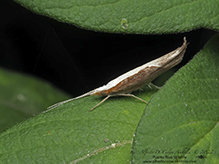 |
|
Babette Kis |
||
Ypsolopha dentella honeysuckle moth Ypsolopha dentella, honeysuckle moth on Solomon's seal leaf at the hedgerow adjacent to Barnes Prairie, Racine Co., WI. Photos were taken July 7, 2022. This striking moth is about 8 mm long, and rests head down. I usually see them in early morning, and late afternoon. |
||
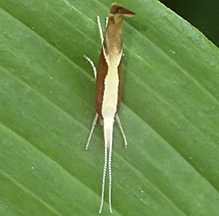 |
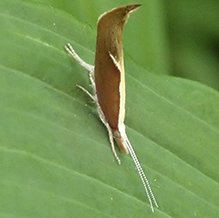 |
|
MinnesotaSeasons.com Photos |
||
|
||
|

Slideshows |
Ypsolopha dentella (Näbbtrymal) |
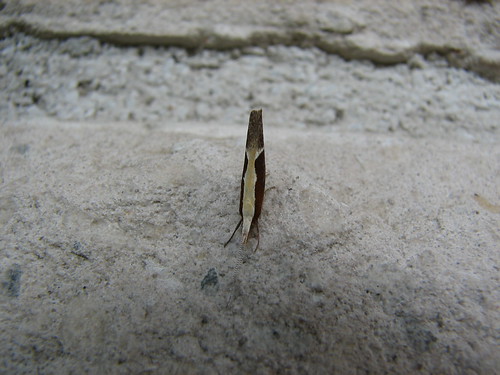
|
Ypsolopha dentella |
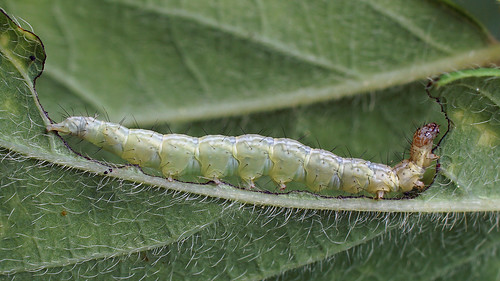
|
About
Honeysuckle moth - Серпокрылая моль зубчатая |

Visitor Videos |
||
Share your video of this insect. |
||
This button not working for you? |
||
|
Other Videos |
||
|

Visitor Sightings |
||
Report a sighting of this insect. |
||
This button not working for you? |
||
Alfredo Colon |
Location: Albany, NY |
 |
| Alfredo Colon 8/8/2022 |
Location: Albany, NY |
| Babette Kis 7/7/2022 |
Location: Barnes Prairie, Racine Co., WI Ypsolopha dentella, honeysuckle moth on Solomon's seal leaf at the hedgerow adjacent to Barnes Prairie, Racine Co., WI. Photos were taken July 7, 2022. This striking moth is about 8 mm long, and rests head down. I usually see them in early morning, and late afternoon. |
MinnesotaSeasons.com Sightings |
||
|

Created: 1/11/2023 Last Updated: © MinnesotaSeasons.com. All rights reserved. |
